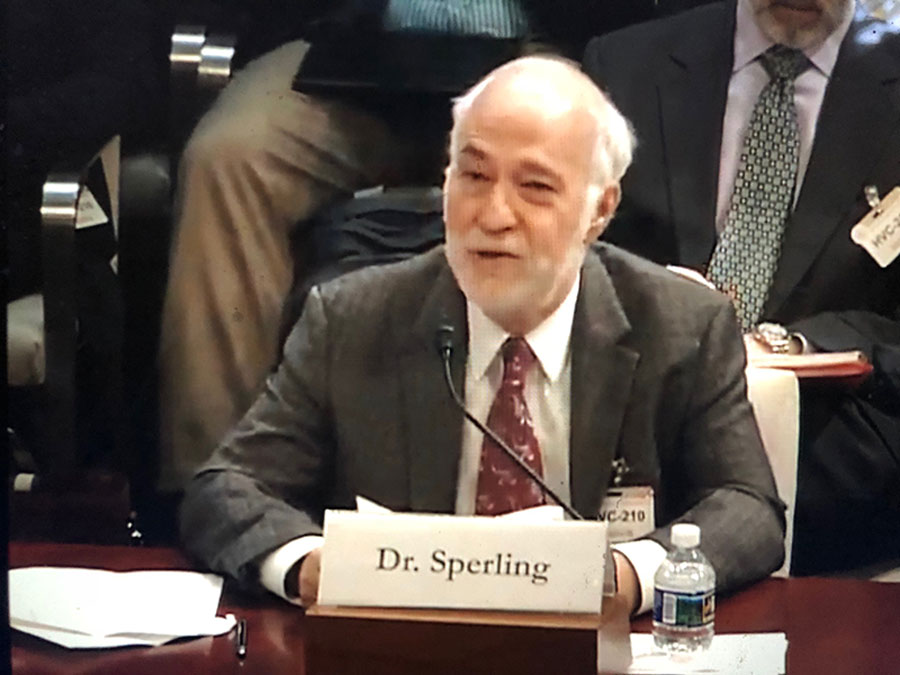ITS-Davis Director Dan Sperling Brings Lessons from California Policy to the U.S. Congress
By Seth Karten

On Tuesday, February 26, ITS-Davis’ founding director and California Air Resources Board (CARB) member Daniel Sperling was the first to testify on one of two panels before the U.S. Congressional House Committee on Transportation & Infrastructure at a hearing entitled “Examining How Federal Infrastructure Policy Could Help Mitigate and Adapt to Climate Change.” Dr. Sperling shared his “experiences from California” and “insights from over 30 years studying the transportation system of this country.”
Throughout his testimony, Dr. Sperling identified policy strategies for promoting more environmental, equitable, and efficient transportation in ways that support the economy and promote innovation without necessarily burdening taxpayers. He said, “The point of this hearing and my testimony, is to address the goal of aligning transportation spending with environmental goals—as well as with social goals.”
In his opening comments, he highlighted how the current transformative revolutions in transportation—electrification, automation, and shared mobility—present government with the challenge and opportunity to “refocus and restructure how we fund and manage our transportation system, such that we direct these many innovations toward the public interest.” A key role for government in supporting innovations is to support “pilot and demonstration programs” to enable necessary experimentation.
Other members on the panel included Vicki Arroyo, of the Georgetown Climate Center; Thomas P. Lyon, of the Stephen M. Ross School of Business, University of Michigan; Ben Prochazka, of the Electrification Coalition; and Nancy Young, from Environmental Affairs at Airlines for America. Ms. Arroyo, whose organization has partnered with ITS-Davis on several events and initiatives, spoke about how multiple states and cities have implemented programs that are “promoting adoption of cleaner vehicles and fuels, improving public transportation, and enacting pathways to fund clean transportation innovation.”
After opening remarks from each of the five panel members, congressional members asked questions and spoke about their concerns over a two-and-a-half-hour period. During this Q & A, Dr. Sperling responded to questions posed by representatives including Julia Brownley (D-CA), Mark DeSaulnier (D-CA), Alan Lowenthal (D-CA), Pete Stauber (R-MN), Lizzie Fletcher (D-TX), Abby Finkenauer (D-IA), and Salud Carbajal (D-CA), who recognized Dr. Sperling for his “testimony and leadership on reducing greenhouse gas emissions.”
In responding to questions, Dr. Sperling highlighted California’s policies and programs that could inform federal policies to promote sustainable transportation. For example, he described how the California Cap and Trade Program “funds probably $1B per year in clean transportation and is also used for affordable housing near transit stations and the greening of communities to reduce emissions—with no taxpayer money.”
Dr. Sperling was also asked about his recommendations regarding “carrots and sticks” in policies to promote sustainable transportation, such as the Sustainable Communities and Climate Protection Act (SB 375). He emphasized the importance of carrots: “We need to reward communities that invest in putting in more chargers, bike lanes, transit, etc., because they don’t have the resources.” He added: “That is my biggest plea, to somehow restructure transportation funding so it acknowledges and rewards these environmental goals as well as the vehicle-miles travelled goals.”
Click on the following links to view: video footage of the entire hearing and Dr. Sperling’s written testimony and opening statement.
Seth Karten is a science writer for the Institute of Transportation Studies at UC Davis.
Thank you for your interest in the UC Davis Institute of Transportation Studies. Subscribe today to keep up with the latest ITS news and happenings.
